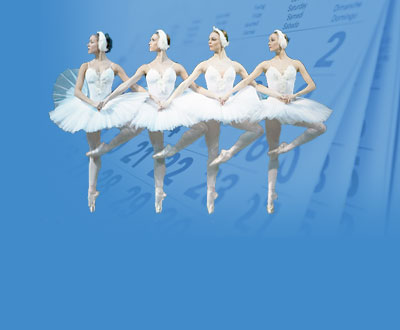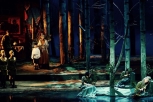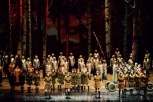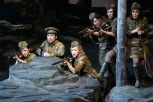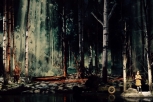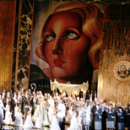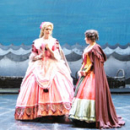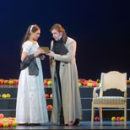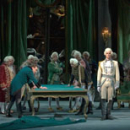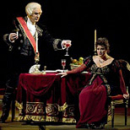Schedule of all St. Petersburg theaters on
one page >>
Please enter theatre's name, actor's name or any other keyword
The Dawns Here Are Quiet (Mariinsky II (New) Theatre, opera)
Genre: Opera Age restriction: 6+ Length: 2 hours
Credits
Music by Tang Jianping
Libretto by Wan Fang (based on the former USSR writer Boris Lvovich Vasilyev’s
novel with the same title)
Director: Wang Xiaoying
Set Designer: Liu Kedong
Lighting Designer: Liu Jianzhong
Costume Designer: Zhao Yan
Make-up Designer: Shen Miao Projection
Designer: Hu Tianji
Choreographer: Jia Fei
Chorus Master: Jiao Miao
Artists
Cast to be announced
The opera The Dawns Here Are Quiet was commissioned in 2015 by the largest Chinese music theatre – National Centre for the Performing Arts – to mark the 70th anniversary of the victory over fascism. Librettist Wan Fang was chosen to adapt Boris Vasilyev’s novel of the same name for the theatre. According to Wan Fang herself, the tragic story of five female soldiers has truly shocked her; the feelings of sorrow, aversion to war and reverence for life she experienced while reading the novel were reflected in the libretto she was writing. The score was written by the famed Chinese composer Tang Jianping (born in 1955); he was charged with a difficult task of stylistically adapting Russian music (including songs of the Soviet times) while looking at them through the prism of Chinese musical and theatrical esthetics. The opera premiered in Beijing on 5 November, 2015.
The Dawns Here Are Quiet is an opera about war, but there are no shots being fired, no enemies prowling around. Stage director Wang Xiaoying said that his production seeks to show the brutality of war, the pain of military losses, the fragility of human life, eternal and universal human emotions. The story unfolds retrospectively: the opera opens with an aria of the aged officer Vaskov, who came to the birch grove to lay flowers to the place of the female anti-aircraft gunmen’s heroic death; five names are mentioned in the lyrics of the aria. The creators of the opera sought to make every single female character unique and memorable; their different personalities are captured in their arias. All female voices are different and the soloists include a coloratura soprano, a lyric soprano, a dramatic soprano, a mezzo-soprano, and a contralto. The gallery of female characters includes psychological portraits of the talented Rita, the beautiful Zhenya, the open and kind Lisa, the sophisticated Sonya, and the imaginative Galya. The quintet Before the Dawn unites all the five voices; the symbolic number is also reflected in the orchestration which includes five string parts. The scene before the dawn takes place before the final battle, before the young soldiers’ death; it is the dramatic focus of the opera. The chorus plays a special role in the scene; it gives ‘voice’ to the birch grove. The creators are simultaneously following the Slavic and the Chinese traditions of breathing life into nature.
The creators have added a number of ‘Russian’ markers into the opera, which are traditionally associated with Russia around the world. They include The Song of the Volga Boatmen, the tunes of both Katyusha and Dorozhen'ka, quotations from Eugene Onegin, ballet waltz, bayan, birch trees...The opera gives us, those who identify with the Russian culture, an opportunity to see ourselves through the eyes of the representatives of an entirely different cultural paradigm. While creating an opera based on a story well-known to every Russian, the Chinese creators could not feel impartial to it. That is why their work is full of deep respect, gratitude and admiration. It only adds to the opera’s charm.
Khristina Strekalovskaya
The Dawns Here Are Quiet is an opera about war, but there are no shots being fired, no enemies prowling around. Stage director Wang Xiaoying said that his production seeks to show the brutality of war, the pain of military losses, the fragility of human life, eternal and universal human emotions. The story unfolds retrospectively: the opera opens with an aria of the aged officer Vaskov, who came to the birch grove to lay flowers to the place of the female anti-aircraft gunmen’s heroic death; five names are mentioned in the lyrics of the aria. The creators of the opera sought to make every single female character unique and memorable; their different personalities are captured in their arias. All female voices are different and the soloists include a coloratura soprano, a lyric soprano, a dramatic soprano, a mezzo-soprano, and a contralto. The gallery of female characters includes psychological portraits of the talented Rita, the beautiful Zhenya, the open and kind Lisa, the sophisticated Sonya, and the imaginative Galya. The quintet Before the Dawn unites all the five voices; the symbolic number is also reflected in the orchestration which includes five string parts. The scene before the dawn takes place before the final battle, before the young soldiers’ death; it is the dramatic focus of the opera. The chorus plays a special role in the scene; it gives ‘voice’ to the birch grove. The creators are simultaneously following the Slavic and the Chinese traditions of breathing life into nature.
The creators have added a number of ‘Russian’ markers into the opera, which are traditionally associated with Russia around the world. They include The Song of the Volga Boatmen, the tunes of both Katyusha and Dorozhen'ka, quotations from Eugene Onegin, ballet waltz, bayan, birch trees...The opera gives us, those who identify with the Russian culture, an opportunity to see ourselves through the eyes of the representatives of an entirely different cultural paradigm. While creating an opera based on a story well-known to every Russian, the Chinese creators could not feel impartial to it. That is why their work is full of deep respect, gratitude and admiration. It only adds to the opera’s charm.
Khristina Strekalovskaya
You may also like
-
Rigoletto (Mariinsky II (New) Theatre, opera)
Mariinsky II (New) Theatre- Genre: Opera
- Language: Italian
-
L'elisir d'amore (Mikhailovsky Theatre, opera)
Mikhailovsky (ex. Mussorgsky) Theatre- Genre: Opera
-
Tosca (Mariinsky II New Theatre, opera)
Mariinsky II (New) Theatre- Genre: Opera
- Language: Italian
-
Betrothal in a Monastery (Mariinsky Theatre, opera)
Mariinsky (ex. Kirov) Ballet and Opera Theatre- Genre: Opera
- Language: Russian (English supertitles)
-
Pagliacci (Mariinsky II (New) Theatre, opera)
Mariinsky II (New) Theatre- Genre: Opera
-
Eugene Onegin (Mariinsky II New Theatre, opera)
Mariinsky II (New) Theatre- Genre: Opera
- Language: Russian (English supertitles)
-
The Oprichnik (Mikhailovsky Theatre, opera)
Mikhailovsky (ex. Mussorgsky) Theatre- Genre: Opera
-
Adriana Lecouvreur (Mariinsky II (New) Theatre, opera)
Mariinsky II (New) Theatre- Genre: Opera
- Language: Italian
-
Lakmé (semi-staged performance) (Mariinsky Theatre, opera)
Mariinsky (ex. Kirov) Ballet and Opera Theatre- Genre: Opera
-
L'italiana in Algeri (Mariinsky Theatre, opera)
Mariinsky (ex. Kirov) Ballet and Opera Theatre- Genre: Opera
-
Carmen (Mikhailovsky Theatre, opera)
Mikhailovsky (ex. Mussorgsky) Theatre- Genre: Opera
- Language: Russian (English supertitles)
-
The Queen of Spades (Mikhailovsky Theatre, opera)
Mikhailovsky (ex. Mussorgsky) Theatre- Genre: Opera
- Language: Russian (English supertitles)
-
Tosca (Mikhailovsky Theatre, opera)
Mikhailovsky (ex. Mussorgsky) Theatre- Genre: Opera
- Language: Italian
 en
en es
es